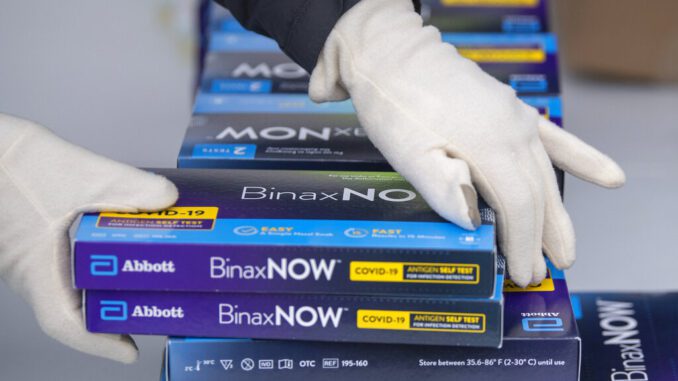
RALEIGH — At least two months prior to the U.S. Centers for Disease Control and Prevention’s December 2021 announcement of new “Test to Stay” protocols for K-12 schools, documents show the ABC Science Collaborative and the N.C. Department of Health and Human Services had already been engaged on the topic.
The CDC made the Test to Stay announcement on Dec. 17, 2021. However, a letter dated Dec. 29, 2021, from the ABC Science Collaborative (ABC) to the N.C. Department of Health and Human Services (NCDHHS) shows those two organizations had already run a related study in the state’s K-12 schools.
According to the ABC letter, districts were enrolled in the “Test-to-Stay in School: COVID-19 Testing Following Exposure in K-12 School Communities” program, which was initiated on Oct. 18, 2021, and ran through Dec. 13, 2021.
The ABC’s letter says the study “collected data from five universally masked school districts and one charter school in North Carolina.” The letter also implies the study is ongoing, stating that “data analysis presented in this report is consistent with ongoing data analysis from later data cut-off dates.”
According to the study report, the sample size included 367 participants across the six schools.
For context, there are over 2,680 public schools across the state’s 115 districts and over 1.43 million K-12 public school students in North Carolina as of fall 2021. If the 367 participants are all students, the study represents less than 1% of all K-12 public school students.
North State Journal (NSJ) reached out to ABC on Dec. 30, 2021, with specific questions about the study size, if adults were included, why they chose only six schools, and why the study period was so brief. Additionally, we asked what control sample was used if participating schools were all “universally masked” and if it was accurate to say that Test to Stay seemed to be another way to maintain continued masking in schools.
ABC declined to answer our questions, stating in a Jan. 7, 2022, email, “Thank you for your questions. We are unable to address each one individually at this time.” ABC referred our outlet back to their website post about the study, which was the basis for some of our questions.
NSJ inquired when ABC would be able to respond to our questions, but we’ve received no response.
NSJ also asked when conversations about Test to Stay began, if parents were contacted about the study and the absence of general public announcements about it. ABC did not answer those questions either.
Former NCDHHS Sec. Mandy Cohen was first asked about Test to Stay at the governor’s COVID-19 briefing on Dec. 20, 2021. Prior to her departure, NSJ sent comparable questions to NCDHHS which were answered via email by Bailey Pennington, a communications specialist with the agency.
NSJ asked if NCDHHS could explain how the agency and ABC were partnered for study specifically on Test to Stay prior to the CDC’s guidance change, when conversations about Test to Stay began, as well as what prompted and who initiated the conversations.
“The ABC Science Collaborative is conducting the Test to Stay Research Study,” Pennington wrote. “To allow for participants to be enrolled and not adhere to published control measures (e.g., requirement to be excluded from school after an exposure), the protocol for the research study needed to be approved by the NC State Health Director, in accordance with Control Measures rule 10A NCAC 41A .0201 (e).”
Pennington wrote that, “After review, approval for the protocol was issued on October 1, 2021.” He also attached a copy of the approval letter to proceed with the study signed by NCDHHS State Health Director and Chief Medical Officer Dr. Elizabeth Tilson.
“The Test to Stay Research Study was designed and implemented by ABC Science Collaborative with approval from the Duke Institutional Review Board,” said Pennington in the email. “They approached DHHS early in the planning process. This data is among the information NCDHHS considered when updating its StrongSchools Toolkit.”
Pennington did not elaborate on the dates ABC approached NCDHHS.
On Dec. 29, 2021, Sen. Deanna Ballard (R-Watauga) sent a letter to Cohen inquiring about the Test to Stay study, asking if NCDHHS would be aligning the StrongSchoolsNC toolkit to the CDC’s guidance. Ballard received a response on Jan. 5, 2022, from Cohen’s interim replacement, Kody Kinsley, that said the agency was “working closely” with the state board of education on the issue.
The N.C. State Board of Education was made aware of the new Test to Stay guidance in a presentation given to the board on Jan. 6, 2022, by Tilson. The following day, on Jan. 7, NCDHHS updated the StrongSchoolsNC toolkit with Test to Stay criteria and procedures.
Like the ABC report, Tilson’s presentation implied the study was not over and that “ABC collaborative has enrolled 7 mask optional school districts in the next phase of the pilot.”
Ballard also asked Cohen if she was ready to answer whether or not the toolkit was a legally binding document, a “recommendation, a law, or a suggestion.” During a December 2021 legislative subcommittee hearing, Cohen had repeatedly dodged the question.
Buried in the middle of the second paragraph of Kinsley’s response, that question was finally answered.
“The Toolkit itself is not a legally enforceable document, but rather strong recommendations for schools on how to reduce the spread of COVID-19,” wrote Kinsley.




